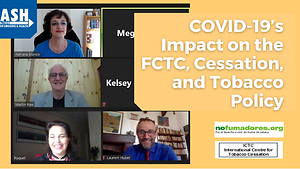Even in ‘normal’ times, the tobacco industry’s marketing and selling of addictive, lethal products like cigarettes is a leading cause of global illness, resulting in more than 8 million deaths per year. Consequently, they are a major drain on national health systems1. This negative impact on society is further exacerbated by the COVID-19 pandemic.
After conducting an extensive review of the literature, the World Health Organization released a scientific brief on 30 June in which they concluded that ‘at the time of this review, the available evidence suggests that smoking is associated with increased severity of disease and death in hospitalized COVID-19 patients’2. This puts smokers at increased risk during the pandemic. Furthermore, given the growing scientific evidence that COVID-19 is transmitted through aerosols3, we should keep tobacco in mind when taking measures to stop the COVID-19 pandemic.
Thus, it is critical that countries intensify and accelerate implementation of the WHO Framework Convention on Tobacco Control4. For example, robust implementation of price and tax measures, mandated in Article 6 of the WHO FCTC, will not only decrease smoking prevalence5 but also will generate much needed funding during the economic crisis caused by COVID-19. To date, according to the WHO Report on the Global Tobacco Epidemic, 2019, only 38 countries have achieved the benchmark of taxes representing 75% or more of final retail price6.
Furthermore, while many countries have reported that an increasing number of smokers have expressed an interest in quitting smoking, access to cessation support is highly uneven around the world. According to a 2017 survey on progress in implementation of Article 14 of the WHO FCTC, on tobacco dependence and cessation, two-thirds of the 142 countries that participated in the survey did not even have an official national treatment strategy7. As a result, many smokers are unable to get the support they need to quit.
Some countries, like Spain for example, have taken some positive steps to protect their citizen’s health by extending smoke-free policies to outdoor areas during COVID-198. But the Spanish government, as well as all governments around the world, could and should do more to take advantage of the WHO FCTC as a tool to advance globally agreed health, development and human rights objectives. This is particularly critical during and after the COVID-19 pandemic.


